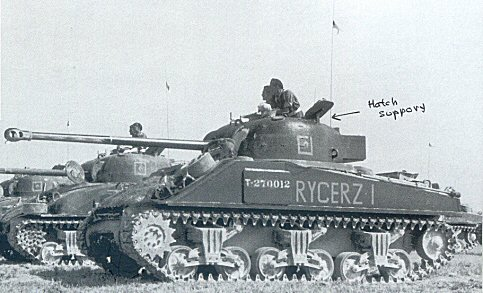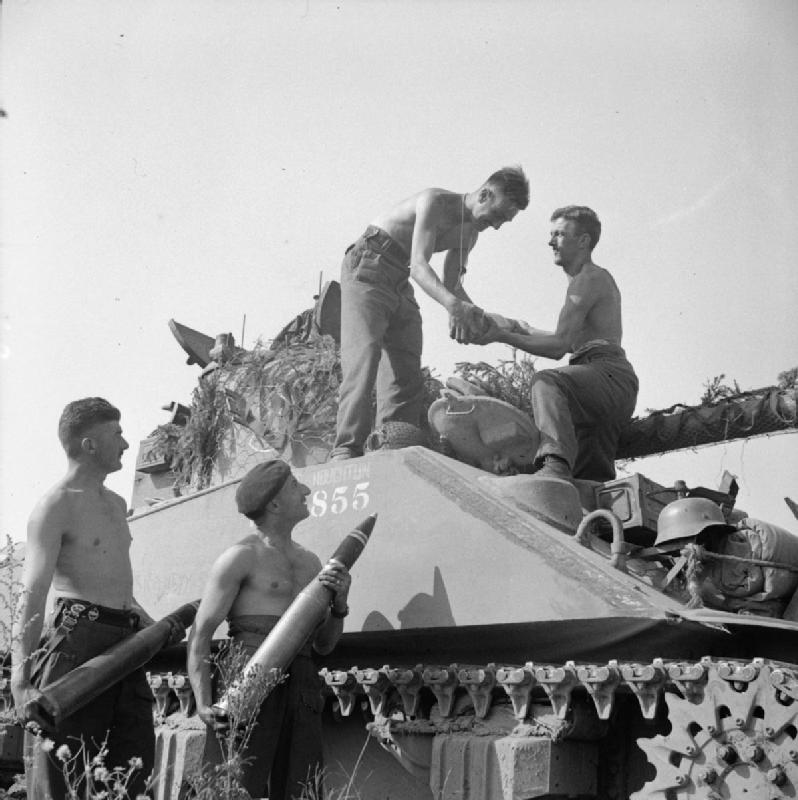Deliveries of Firefly to units only commenced in April 1944,
just a few weeks before Overlord & left minimal time for familiarisation.
Armoured Regiments mostly utilised Fireflies on a basis of 1 per troop of 4 tanks. /2
Finally each armoured regiment troop had access to integral, meaty, anti-tank firepower capable of dealing serious damage to any German AFV likely to be encountered. /3
The dual purpose 75mm gun was quite capable of laying down a reasonable HE shell or AP round for dealing with Panzer III or IV.
Firefly's 17 Pounder had.... problems with HE, but excelled at tank killing. So Tigers and Panthers would need to be wary. /4
Firefly's design history dated back to March 1943 when the General Staff published "Policy on Tanks" which effectively stated the majority of tanks should have a good HE weapon and...
[See image below] /5
This would spur development of the A30 Challenger from Cromwell chassis, but that's something best looked at on a later date.
tldr it encounters serious problems and between August and October concurrent work begins to investigate if you can bodge a 17 pounder onto a Sherman. /6
In Mark Haywood's excellent study exploring Firefly he queries nomenclature, noting that Firefly tends to be uniformly adopted by units after issue (bar 24th Lancers who love Mayfly), hinting this nickname was attached much earlier during development & caught on with units. /7
Getting a 17 pounder into a Sherman proves hard enough and the development story is pretty amazing, another case study that modern militaries should seriously consider.
I fixed the popular meme on this.
Dear INTERNET,
You are, as always,
WELCOME. /8
I waffle about it here on an astonishingly poor Periscope upload from Bovvy.*
*If you may potentially enjoy more of this sorta stuff on YT etc, or if u want cool new tank docus etc, then give me a shout. /9
https://t.co/QsJuS19l07
It's also worth bearing in mind that Tank Regiments, armed with Churchills, had not been forgotten and would operate closely with Corps Anti-Tank Regiments whose M10 (or M10 17 Pdr) provided similarly impressive firepower on the basis of about one SP AT Tp per Tank Squadron. /10
Churchills were already being fitted with brand new ARV cupolas, improving visibility, but there were currently no suitable ARV cupolas for Firefly which limited tank commander's observation to M4 periscopes with negligible magnification or unbuttoning and using binocs. /11
This was a problem.
But there was a much bigger one for Firefly crews. The gunner relied on the No. 43 Telescope with 3x magnification, but this was no better than the standard Sherman's offering.
You know, for a long ranged heavy tank killer. /12
So the gunner has, to start with, a shit scope to try and discern targets - then actually nail them in a spot to inflict maximum damage.
Also if you are using APDS, SABOT, rounds then this sight isn't graduated to that at all.
Nope.
Good fuckin' luck. /13
And like the ferocious muzzle blast, even with the muzzle break, could easily obscure observation of the shot's flight - meaning correcting trajectory of APDS rounds was all but impossible.
Srsly good fuckin' luck. /14
This was a real ballache when you could only get five ready rounds stored in the turret basket. These reloads took 6 to 7 seconds, but when exhausted... rounds from the hull bin took about ten seconds to handle up.
Weighing up to 17 kg. /15
The 17 pounder's 15" recoil was also a right shitbag to deal with, and still maintain concentration, in what was a cramped three man turret.
A core reason they cut a hole in the back of the turret to shove the radio out of to start with! /16
How much better was 17 pounder than the Sherman's standard 75mm Gun M3 at penetrating armour firing APC?
75mm
1,000 yds: 62mm pen
1,600: 55mm
2k: 50mm
17 pdr
1,000 yds: 111mm pen
1,600: 95mm
2k: 87mm
17 pdr APDS was even better
1,000 yds: 172mm pen
1,600: 155mm
2k: 153mm /17
Unfortunately there was another catch when firing APDS, that accuracy in ranges over 900 yds plummetted, with SABOT only guaranteed accurate to 450 yards
At 1,000 yds APC had a 45.3% chance of hitting the target versus APDS at 14.9%.
However... /18
This was really attributed to myriad causes, the much faster/flatter trajectory of SABOT, clipping the muzzle break on firing... and let's not forget the human element, as just firing APDS placed radically different demands on the gunner since the sight was shit. /19
This all means that good gunners on Fireflies were basically running impressive trig, as despite having access to a phenomenal weapons system the optics were just no where near up to scratch, observation of shot... umm, tricky to say the least, and firing rather disconcerting./20
A good number of units didn't even receive theirs until May, and it was only on 6 April that regiments sent cadres to witness Kirkcudbright before having a couple of days on the range to hone their skills.
Yup two months before 6 June.
Two whole months. /21
For all the problems in then training crews to a state of competence with the new weapon... they managed to achieve it and ultimately as most tank on tank engagements in Normandy were <1,000 yds it could easily KO a Tiger at such range. /22
But long range kills were achieved in during the campaign, one Firefly from 4 Armoured Brigade destroyed a German tank at a crazy 2,400 yards.
1.3 miles or 2.19 km.
Astonishing feat of gunnery. /23
Ultimately the decision to race Firefly into service was undeniably the right one, but it would take several months for crews to receive upgraded sights and greatly improve effectiveness.
That said, it ultimately proved a massively upgraded triumph and gave Armd Regts... /23
serious integral anti-tank capability which they had previously lacked, and some confidence when dealing with heavier armour.
A fantastic case study on meshing a proven, modular chassis with dynamic weapons system, but also... what can be overlooked in the process. /thread






















